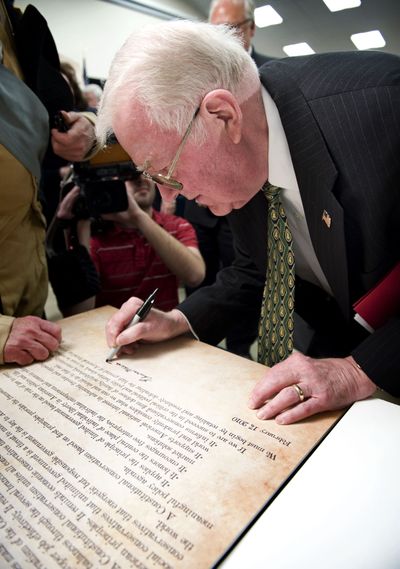Conservatives sign accord
Leaders’ statement urges return to ‘founding ideas’

ALEXANDRIA, Va. – With polls and recent elections suggesting a possible comeback for Republicans, a group of prominent conservatives unveiled a statement of principles Wednesday called Constitutional Conservatism that they hope will guide a new era of governing.
“A year ago, some pundits claimed that conservatism was effectively dead. But today, as revelations about Washington’s futility in addressing America’s problems continue to mount, the movement is alive and poised for a resurgence of Constitutional Conservative leadership,” former Attorney General Edwin Meese said.
Meese, who served under President Ronald Reagan, was one of several dozen conservatives who drafted and signed the statement, dubbed the Mount Vernon Statement because they introduced it at a museum that once was part of George Washington’s Virginia estate of the same name.
Others noted that they were following in the footsteps of the late conservative icon William F. Buckley Jr. and others who signed a similar statement in 1960.
The statement reaffirms their goal of a limited government coupled with a strong national defense.
“Through the Constitution, the Founders created an enduring framework of limited government based on the rule of law,” said the statement from a group that included such figures as American Conservative Union President David Keene; Tony Perkins, the president of the Family Research Council; and Grover Norquist, the president of Americans for Tax Reform.
“Each one of these founding ideas is presently under sustained attack. In recent decades, America’s principles have been undermined and redefined in our culture, our universities and our politics. … The federal government today ignores the limits of the Constitution, which is increasingly dismissed as obsolete and irrelevant.”
Just as conservatives oppose Democratic President Barack Obama’s expansion of the federal government, the call for Constitutional Conservatism also was an alternative to Republican former President George W. Bush’s “compassionate conservatism.”
Many conservatives balked at the rapid rise in nondefense spending under Bush and at the expansion of unchecked government power in the name of fighting terrorism after the 2001 attacks.
The signers of the statement, which by design excluded elected officials, warned the three branches of modern conservatism that each should mind the other, and that none should pursue greater federal government power in the name of its own cause.